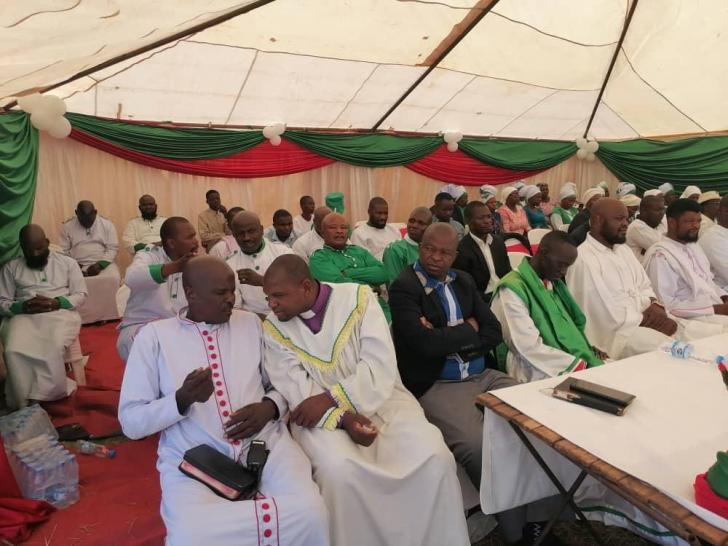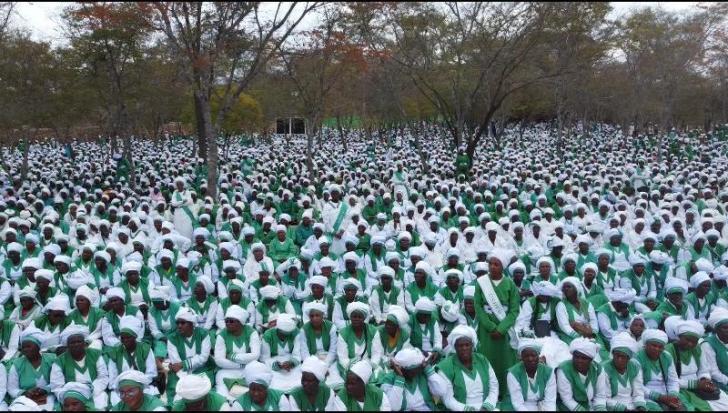News / Religion
Indigenous churches should own properties
11 Dec 2023 at 14:08hrs |
351 Views

The Saint John Apostolic Church of the Whole World's Projects Director, Mr Francis Mugandani urged indigenous churches to own properties and become self-reliant, fully empowered and realise development to boost religious tourism.
Speaking during the church's end-of-year gathering in Harare, on Sunday, Mugandani encouraged indigenous churches to participate in all processes and prerequisites which enable previously marginalised indigenous churches to acquire properties and land as the basics for boosting religious tourism development and theological archiving.

"It is the time for indigenous churches to be empowered through property ownership and control in their tireless efforts to realise sustainable development of our societies in the motherland, Africa," said Mugandani.
"Religious tourism has become one of income generation avenue amongst African countries where several tourists flock to trace theological narratives, monuments and curriculum. In this process therefore, it will enable them to archive historical context and content of each church which will be archived for respective churches to benefit generations to come (sustainable development)," Mugandani noted.
"Acquiring properties and land for development would also help in contributing towards National Development Strategy 1, thus contributing to economic development and Gross Domestic Products," Mugandani close remarks.
Meanwhile, the church's national leader for Australia, Mr Cornelius Chirairo has commended the efforts by their church in ensuring that it realise property ownership, evangelism and fellowships.
"We really appreciate the commitment by our leadership in globalising previously marginalsed indigenous churches and their commitment towards suiting global standards," Chirairo said.
"This event is also another platform for self introspection to confirm, assess, analyse and report on the progresses being made in transforming our church and conformity to constitutional laws and regulations for all countries from which we operate in. This is in relationship to our efforts in owning properties for fellowship and theological archiving purposes for the benefit of next generations, " Chirairo added.
Property ownership and control has been a major challenge faced by several indigenous churches in Africa. The then colonial-led mainline churches were acquiring vast tracts of land on zero deposits whilst also accessing grants to develop their respective infrastructure.
Some churches have also resorted to congregate in open spaces (open air worshipping) whilst others rent properties to worship. This has forced some churches to be evicted after failing to raise monies for rentals, whilst others fallen trap to litigation as they do not own land.
Speaking during the church's end-of-year gathering in Harare, on Sunday, Mugandani encouraged indigenous churches to participate in all processes and prerequisites which enable previously marginalised indigenous churches to acquire properties and land as the basics for boosting religious tourism development and theological archiving.

"It is the time for indigenous churches to be empowered through property ownership and control in their tireless efforts to realise sustainable development of our societies in the motherland, Africa," said Mugandani.
"Religious tourism has become one of income generation avenue amongst African countries where several tourists flock to trace theological narratives, monuments and curriculum. In this process therefore, it will enable them to archive historical context and content of each church which will be archived for respective churches to benefit generations to come (sustainable development)," Mugandani noted.
Meanwhile, the church's national leader for Australia, Mr Cornelius Chirairo has commended the efforts by their church in ensuring that it realise property ownership, evangelism and fellowships.
"We really appreciate the commitment by our leadership in globalising previously marginalsed indigenous churches and their commitment towards suiting global standards," Chirairo said.
"This event is also another platform for self introspection to confirm, assess, analyse and report on the progresses being made in transforming our church and conformity to constitutional laws and regulations for all countries from which we operate in. This is in relationship to our efforts in owning properties for fellowship and theological archiving purposes for the benefit of next generations, " Chirairo added.
Property ownership and control has been a major challenge faced by several indigenous churches in Africa. The then colonial-led mainline churches were acquiring vast tracts of land on zero deposits whilst also accessing grants to develop their respective infrastructure.
Some churches have also resorted to congregate in open spaces (open air worshipping) whilst others rent properties to worship. This has forced some churches to be evicted after failing to raise monies for rentals, whilst others fallen trap to litigation as they do not own land.
Source - Byo24News
Join the discussion
Loading comments…





























